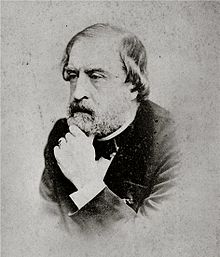| Works/Mp3 Biography Links Books Worklist | Biography ofAmbroise Thomas5 aug 1811 (Metz) - 12 feb 1896 (Paris) |
| Buy sheetmusic from Thomas at SheetMusicPlus |

Woodburytype of Ambroise Thomas, circa 1880
Charles Louis Ambroise Thomas (5 August 1811, Metz – 12 February 1896, Paris) was a French composer, best-known for his operas Mignon (1866) and Hamlet (1868, after Shakespeare) and as Director of the Conservatoire de Paris from 1871 till his death.
Biography"There is good music, there is bad music, and then there is Ambroise Thomas." - Emmanuel Chabrier Early life and studiesThomas's parents were music teachers. By the age of 10 he was already an experienced pianist and violinist. In 1828, he entered the Paris Conservatoire, where he studied with Jean-François Le Sueur (who also taught Berlioz) while at the same time taking piano lessons privately from the famous virtuoso Frédéric Kalkbrenner. In 1832, his cantata Hermann et Ketty won the Conservatory's prestigious composition prize, the Grand Prix de Rome, which allowed him to travel to and study in that city for three years. He took with him a love for Mozart and Beethoven; but once in Rome, he became an ardent admirer of the Italian cantilena and melodic tradition. It was during his Italian sojourn that he wrote all of his chamber music: namely, a piano trio, a string quintet and a string quartet. CareerThe first opera Thomas composed, La double échelle (1837), was produced at the Opéra Comique and subsequently received 247 performances. Le caïd (1849), did still better, and achieved over 400 performances. For the next quarter of a century Thomas's productivity was incessant, and several of his operas (he wrote 24 altogether) enjoyed a considerable, if ephemeral, popularity. The questionable quality of their libretti hampers them, but a few have been revived now and then as historic curiosities or recorded as vehicles for bel canto singers, such as Le songe d'une nuit d'été (1850; loosely adapted from Shakespeare's A Midsummer Night's Dream) or Psyché (1857). The overture to Raymond (1851) has also been given the occasional modern performance. To his theatrical successes, Thomas added administrative achievements. In 1856 he acquired a professorship at the Conservatoire, where he taught, among others, Jules Massenet, one of the few French composers of the younger generation whose music interested him. He succeeded Auber as director of the Conservatoire in 1871. Baffled by the musical unconventionality of César Franck, Gabriel Fauré, and certain other Conservatoire colleagues, he nevertheless was rather well liked as a man, even by those who found his output old-fashioned. Success
Ambroise Thomas wearing his medals from the Légion d'honneur.
With Mignon (premiered at the Opéra Comique in 1866), Thomas achieved his first great acclaim outside, as well as within, France. Goethe's celebrated tale had provided inspiration for a highly sentimentalized libretto; Marie Galli-Marié (1840–1905), it was said [1], "had modelled her conception of the part upon the well-known picture by Ary Scheffer". Mignon was a success all over Europe, to audiences who had embraced Charles Gounod's indirectly Goethe-inspired Faust (1859); and in Paris Mignon received more than a thousand performances by 1894, thereby becoming one of the most successful operas in French history. [2] It is still heard sometimes today, more often in the form of extracts for concert use, or in recordings, than in complete stagings. One of its arias, "Connais-tu le pays", was for generations among the most famous operatic excerpts by any composer. Thomas turned to Shakespeare again for his Hamlet (Paris Opera, 1868), with a libretto by the seasoned team of Jules Barbier and Michel Carré. This opera has a strong, dramatic libretto, although it closes with a traditional (and, surprising for Hamlet) happy ending. It enjoyed a long vogue, and like Mignon it continues to have a certain following; during 2010 it was heard at New York's Metropolitan Opera. His last opera, Françoise de Rimini (Paris Opéra, 1882) based on a passage from Dante's Inferno, failed to stay in the repertoire. Seven years later La tempête, a ballet (and yet another treatment of a Shakespeare play, this time The Tempest), was produced at the Opéra, again with little effect. He died in 1896. Massenet had hopes of succeeding him in the job of Conservatoire director, but abandoned this aim when told by the government that the post would no longer carry lifelong tenure. WorksOperasSee List of operas by Ambroise Thomas Ballets
Other works
References
Further reading
External links
| |
This article is licensed under the GNU Free Documentation License. It uses material from the Wikipedia article "Ambroise Thomas. Allthough most Wikipedia articles provide accurate information accuracy can not be guaranteed. |
| Buy sheetmusic from Thomas at SheetMusicPlus |
Help us with donations or by making music available!
©2023 Classic Cat - the classical music directory

Mendelssohn-Bartholdy, F.
A Midsummer Night's Dream
Vienna Symphonic Orchestra
Tchaikovsky, P.I.
The Nutcracker - suite
Sandro Bisotti
Palestrina, G.P. da
Alma Redemptoris Mater
Corale Polifonica Psalterium
Bach, J.S.
Prelude and Fugue in D minor "Fiddle"
Kelvin Smith
Bach, J.S.
Brandenburg Concerto No. 1
Columbia Chamber Orchestra
Beethoven, L. van
Symphony No. 8 in F major
New York Philharmonic Orchestra


